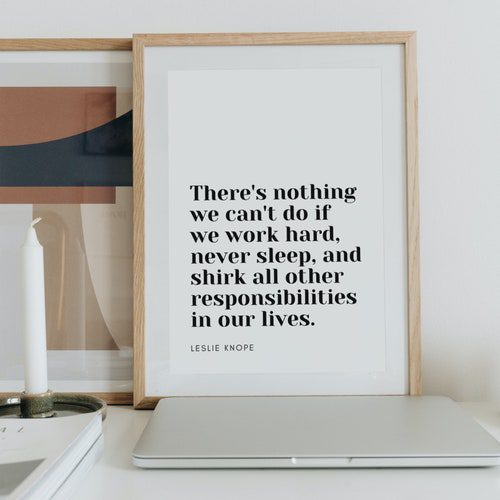Parks and Recreation’s Leslie Knope and Ron Swanson have opposing approaches to work, but their deep respect for one another and willingness to compromise allows for a surprisingly effective working relationship. Leslie values teamwork and collaboration while Ron emphasizes individualism and self-sufficiency. The clash between their work styles highlights the importance of finding a balance between the two in the workplace. The show teaches valuable lessons about the need for compromise, the value of collaboration, and the importance of individualism. By working toward a common goal, the Parks and Recreation Department is able to accomplish more than anyone could on their own.
Parks and Recreation: Leslie Knope vs. Ron Swanson – A Clash of Work Styles
Introduction
Parks and Recreation is a beloved television show that ran from 2009 to 2015. It follows the daily lives of the employees of the Parks and Recreation Department in Pawnee, Indiana, and their efforts to improve the city.
The Characters
One of the most compelling aspects of the show is the clash of work styles between two of its main characters, Leslie Knope and Ron Swanson.
Leslie Knope
Leslie Knope, played by Amy Poehler, is the deputy director of the Parks and Recreation Department. She is incredibly passionate about her job and believes that the government can make a positive difference in people’s lives. Leslie is known for being hyper-organized, ambitious, and optimistic.
Ron Swanson
Ron Swanson, played by Nick Offerman, is the director of the Parks and Recreation Department. He is a libertarian who believes that government should be as small and uninvolved as possible. Ron is known for being gruff, no-nonsense, and fiercely independent.
The Clash of Work Styles
Leslie and Ron represent two diametrically opposed approaches to work, which often leads to conflict.
Leslie’s Approach
Leslie is a workaholic who takes her job very seriously. She is constantly coming up with new ideas to improve the city and is not afraid to put in long hours to see them through. Leslie values teamwork and collaboration, and she is always willing to go the extra mile to help her colleagues succeed.
However, Leslie’s enthusiasm can sometimes lead her to take on too much at once, leaving her tired and burnt out. She is also prone to micromanaging and can become frustrated when people don’t share her level of passion and dedication.
Ron’s Approach
Ron is the ultimate “hands-off” boss. He firmly believes in letting his employees do their jobs without interference. Ron values individualism and self-sufficiency, and he is a master of delegation.
However, Ron’s approach can sometimes lead to confusion and miscommunication among his employees. He can also be dismissive of ideas and suggestions that don’t align with his own worldview.
Their Working Relationship
Despite their differences, Leslie and Ron have a deep respect for each other and a working relationship that is surprisingly effective. Both characters are able to set aside their personal beliefs and find common ground for the good of their department.
Leslie often acts as a buffer between Ron and the rest of the department, interpreting his wishes and explaining them in a way that is more palatable to her colleagues. Ron, on the other hand, trusts Leslie implicitly and is willing to follow her lead when he feels it is necessary.
The Lessons Learned
The clash of work styles between Leslie and Ron highlights the importance of finding a balance between individualism and teamwork in the workplace. It also shows that different approaches to work can coexist and even complement each other, as long as people are willing to listen and compromise.
The Importance of Collaboration
Leslie’s approach emphasizes the value of teamwork and collaboration in achieving success. By working together and pooling their resources, the Parks and Recreation Department is able to accomplish more than any one person could on their own.
The Value of Individualism
Ron’s approach emphasizes the importance of self-sufficiency and individualism. By trusting his employees to do their jobs without interference, Ron is able to empower them and help them develop their skills.
The Need for Compromise
Ultimately, Leslie and Ron are able to find common ground by being willing to listen to each other and compromise when necessary. By setting aside their personal beliefs and working toward a common goal, they are able to build a department that is successful and effective.
Conclusion
The clash of work styles between Leslie Knope and Ron Swanson in Parks and Recreation is a perfect example of how different approaches to work can coexist and even complement each other. By emphasizing the importance of collaboration, individualism, and compromise, the show teaches viewers valuable lessons about how to succeed in the workplace.
